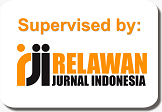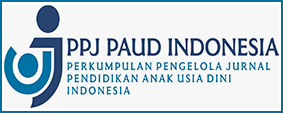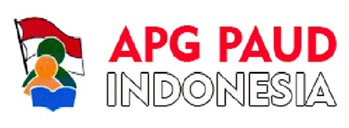PENDIDIKAN AGAMA HINDU PADA PAUD DAN INTERNALISASI MODERASI BERAGAMA DALAM PERSPEKTIF TRI HITA KARANA
Abstract
Education is a conscious and planned effort to achieve competence, while Hindu education has two dimensions. Firstly, religious education is a form of transfer of religious knowledge to students. Secondly, Hindu religious education is a transformation of knowledge to improve sradha and bhakti and strengthen character. Today, radical understanding is a threat to watch out for. Thus, religious moderation is a solution to building religious harmony. Hindu religious education is one of the foundations of human values that strengthens religious moderation, especially in early childhood education. So, in a plural life, a universal value and concept are needed, which does not only lean towards one side, tri hita karana. The method used is a literature review, where data is analyzed by reviewing relevant libraries related to tri hita karana. Based on the literature review results, important things were obtained related to Hindu religious education, religious moderation, and Tri hita karana. In the concept of parhyangan, religious education in Early Childhood Education aims at paramartha, that education is directed towards achieving spiritual awareness. In contrast, in religious moderation, parhyangan seeks to provide reinforcement that every religion has the same belief in worshiping God. In the concept of pawongan and palemahan, religious education in Early Childhood Education to realize parartha can live in the world, side by side with others, and in religious moderation, pawongan reinforces that moderation does not change religion but changes excessive religious behavior, so the purpose of religious moderation is to glorify humans to build harmonious relationships. This study is expected to be theoretical and practical, especially as a reference library for relevant studies in the future.
References
Budiantara, I. K. D. (2017). Implementasi Ajaran Tri Hita Karana pada Masyarakat Hindu di Desa Sengkidu Kecamatan Manggis Kabupaten Karangasem. Lampuhyang, 8(2), 1–26. https://doi.org/10.47730/jurnallampuhyang.v8i2.64
Bungin, B. (2001). Metodologi Penelitian Sosial: Format-Format Kuantitatif dan Kualitatif (1st ed.). Airlangga University Press.
Djamal, M. (2015). Paradigma Penelitian Kualitatif (A. Choiran Marzuqi (ed.); 1st ed.). Pustaka Pelajar.
Fahriansyah, R. A., & Hermansyah, A. (2019). Tindak Pidana Pelecehan Seksual Oleh Guru Terhadap Siswi Sekolah Menengah Atas Yang Diselesaikan Dengan Diversi (Suatu Penelitian Di Wilayah Hukum Kepolisian Resor Aceh Utara). Jurnal Ilmiah Mahasiswa Bidang Hukum Pidana, 3(3), 547–557. https://jim.unsyiah.ac.id/pidana/article/view/16397
Hidayatulloh, I., & Armansyah, N. (2021). Ancaman Paham Radikalisme Pada Generasi Muda. JHP17 (Jurnal Hasil Penelitian), 6(1), 44–48. https://jurnal.untag-sby.ac.id/index.php/jhp17/article/view/6132
Husamah, Restian, A., & Widodo, R. (2015). Pengantar Pendidikan (1st ed.). UMM Press.
Ishak, D. (2020). Pelecehan Seksual Di Institusi Pendidikan: Sebuah Perspektif Kebijakan. Akselerasi: Jurnal Ilmiah Nasional, 2(2), 136–144. https://doi.org/10.54783/jin.v2i2.462
Karuru, P. (2013). Pentingnya Kajian Pustaka Dalam Penelitian. Jurnal Keguruan Dan Ilmu Pendidikan, 2(1), 1–9. http://journals.ukitoraja.ac.id/index.php/jkip/article/view/149
Maritsa, A., Hanifah Salsabila, U., Wafiq, M., Rahma Anindya, P., & Azhar Ma’shum, M. (2021). Pengaruh Teknologi Dalam Dunia Pendidikan. Al-Mutharahah: Jurnal Penelitian Dan Kajian Sosial Keagamaan, 18(2), 91–100. https://doi.org/10.46781/al-mutharahah.v18i2.303
Paramartha, W., & Yasa, I. W. S. (2017). Mengungkap Model Pendidikan Hindu Bali Tradisional Aguron-guron. Mudra : Jurnal Seni Budaya, 32(1), 131–140. https://doi.org/10.31091/mudra.v32i1.92
Ratnaya, I. G. (2011). Dampak Negatif Perkembangan Teknologi Informatika Dan Komunikasi Dan Cara Antisifasinya. JPTK (Jurnal Pendidikan Teknologi Dan Kejuruan), 8(1), 17–28. https://doi.org/10.23887/jptk-undiksha.v8i1.2890
Ridwan, M., Suhar, A., Ulum, B., & Muhammad, F. (2021). Pentingnya Penerapan Literature Review pada Penelitian Ilmiah. Jurnal Masohi, 2(1), 42–51. https://journal.fdi.or.id/index.php/jmas/article/view/427
Saitya, I. B. S. (2020). Tri Hita Karana dalam Teks Agastya Parwa. Sphatika: Jurnal Teologi, 11(1), 13–21. https://doi.org/10.25078/sp.v11i1.1491
Sena, I. G. M. W. (2020). Relasi Manusia, Alam dan Tuhan Dalam Harmonisasi Semesta. Sphatika: Jurnal Teologi, 9(1), 15. https://doi.org/10.25078/sp.v9i1.1598
Suarniti, G. A. M. R. (2017). Peranan Perempuan Dalam Teks Tradisional Bali Geguritan Diah Sawitri. Retorika : Jurnal Ilmu Bahasa, 3(1), 134–144. https://doi.org/10.1017/CBO9781107415324.004
Subawa, P. (2021). Falsafah Tri Hita Karana Sebagai Pondasi Moderasi Beragama. Widyacarya: Jurnal Pendidikan, Agama Dan Budaya, 5(1), 65–69. https://doi.org/10.55115/widyacarya.v5i1.1063
Sugiyono. (2020). Metode Penelitian Kualitatif Untuk Penelitian yang bersifat: Eksploratif, Enterpretif, Interaktif dan Konstruktif (S. Y. Suryandari (ed.); 1st ed.). ALFABETA.
Sunny, M. P. (2018). Pentingnya Penerapan Etika Kepemimpinan Hindu Di Bali Berlandaskan Asta Brata Dengan Berbasis Tri Hita Karana. Vidya Mertta, 1(2), 84–93. https://doi.org/10.32795/vw.v1i2.192
Tim Penyusun. (2019). Moderasi Beragama (O. Fathurahman & M. A. Sila (eds.); 1st ed.). Badan Litbang dan Diklat Kementerian Agama.
Wiana, I. K. (2018). “Sad Kertih”: Sastra Agama, Filosofi, dan Aktualisasinya. Jurnal Bali Membangun Bali, 1(3), 169–180. https://doi.org/10.51172/jbmb.v1i3.29
Widana, I. G. K. (2020). Etika Sembahyang Umat Hindu (I. B. P. E. Suadnyana (ed.); 1st ed.). UNHI Press. http://repo.unhi.ac.id/jspui/bitstream/123456789/1260/1/Etika Sembahyang Umat Hindu.pdf
Wijaya, A. A. P. S. (2010). Saya Bangga Beragama Hindu (I Ketut Donder (ed.); 1st ed.). Paramita.
Wijaya, I. M. T. (2022). Moderasi Beragama Sebagai Langkah Untuk Mengembalikan Jati Diri Agama Hindu. Vidya Samhita : Jurnal Penelitian Agama, 8(1), 74–80. http://ojs.uhnsugriwa.ac.id/index.php/VS/article/view/857
Yunus, A. F. (2017). Radikalisme, Liberalisme dan Terorisme: Pengaruhnya Terhadap Agama Islam. Jurnal Studi Al-Qur’an, 13(I), 76–94. https://doi.org/10.21009/JSQ.013.1.06

This work is licensed under a Creative Commons Attribution-ShareAlike 4.0 International License.
Authors who publish with this journal agree to the following terms:
- Authors retain copyright and grant the journal right of first publication with the work simultaneously licensed under a Creative Commons Attribution-ShareAlike 4.0 International License that allows others to share the work with an acknowledgement of the works authorship and initial publication in this journal.
- Authors are able to enter into separate, additional contractual arrangements for the non-exclusive distribution of the journals published version of the work (e.g., post it to an institutional repository or publish it in a book), with an acknowledgement of its initial publication in this journal.
- Authors are permitted and encouraged to post their work online (e.g., in institutional repositories or on their website) prior to and during the submission process, as it can lead to productive exchanges, as well as earlier and greater citation of published work (See The Effect of Open Access).











.png)








